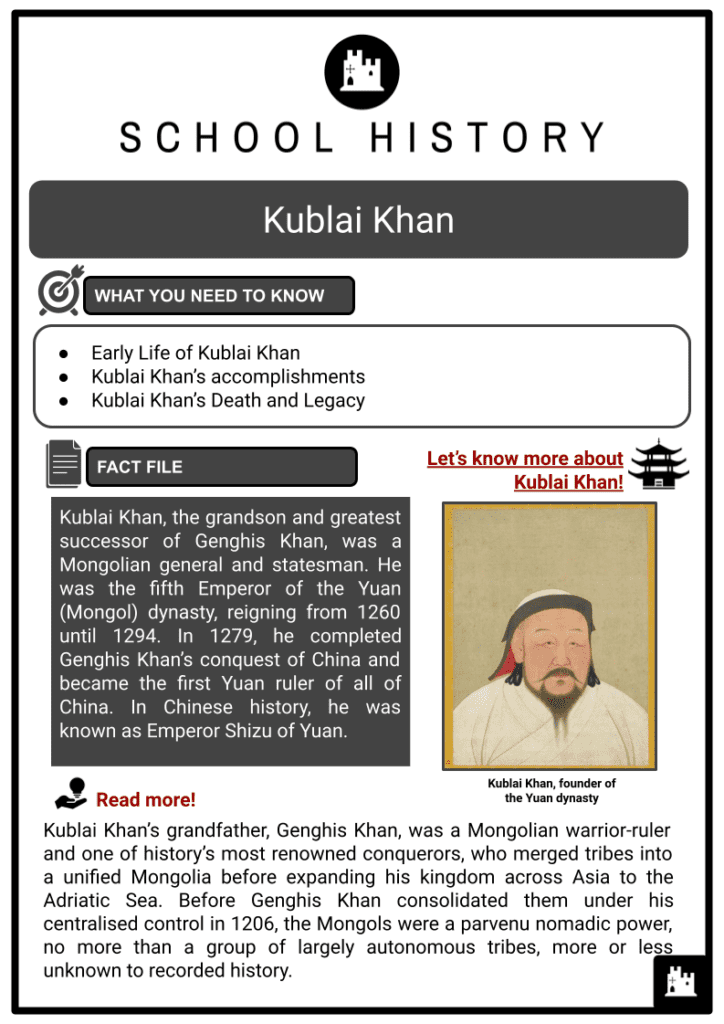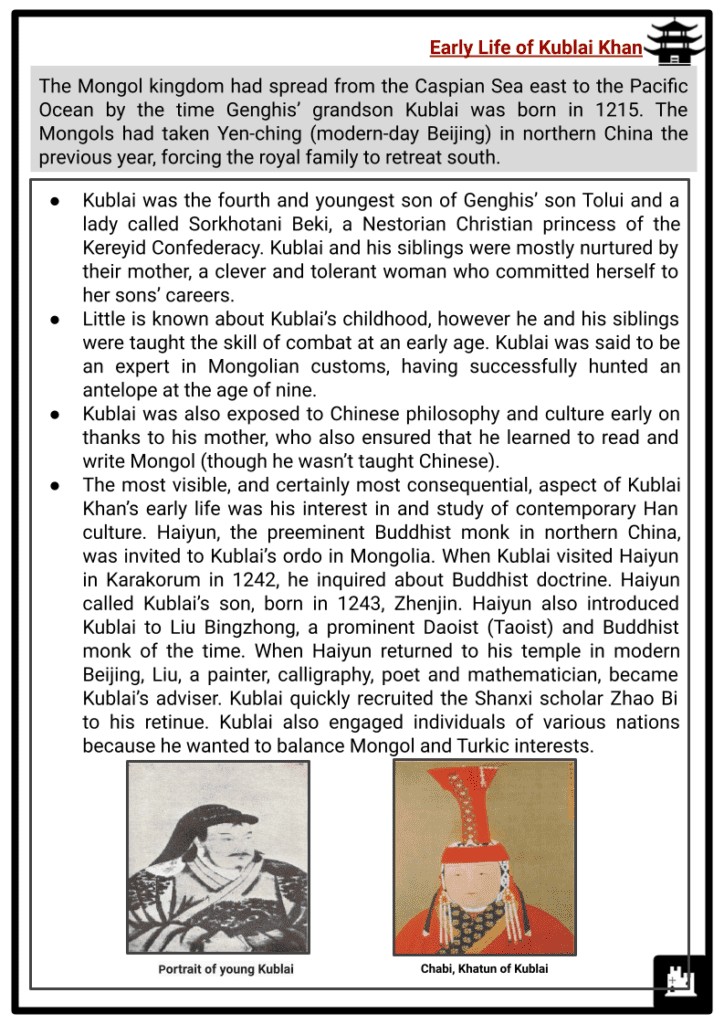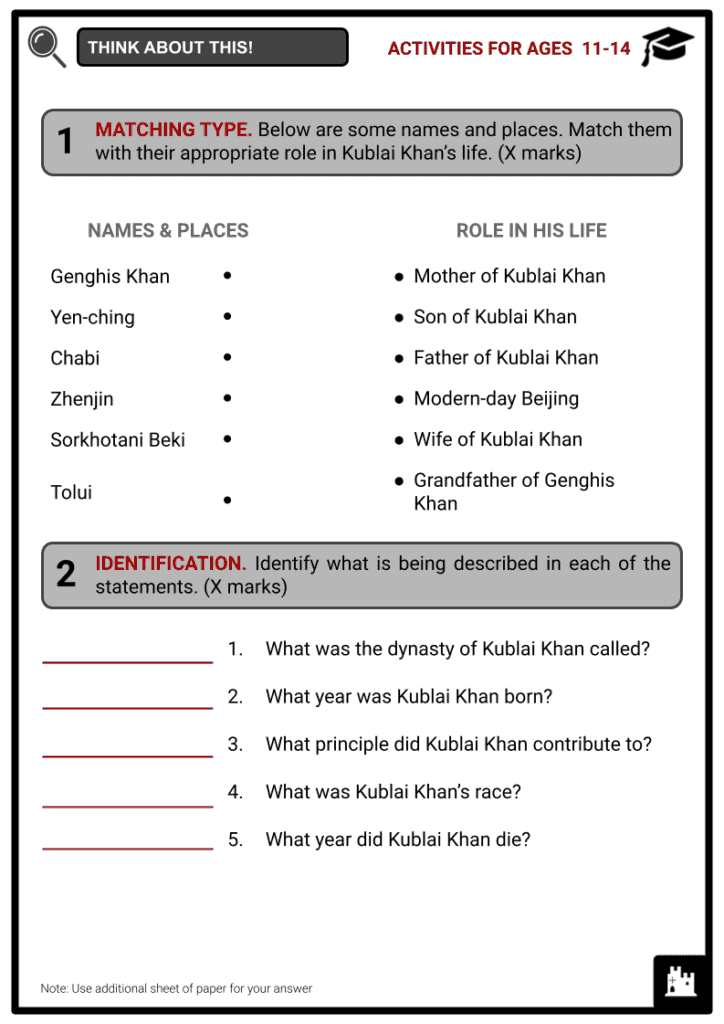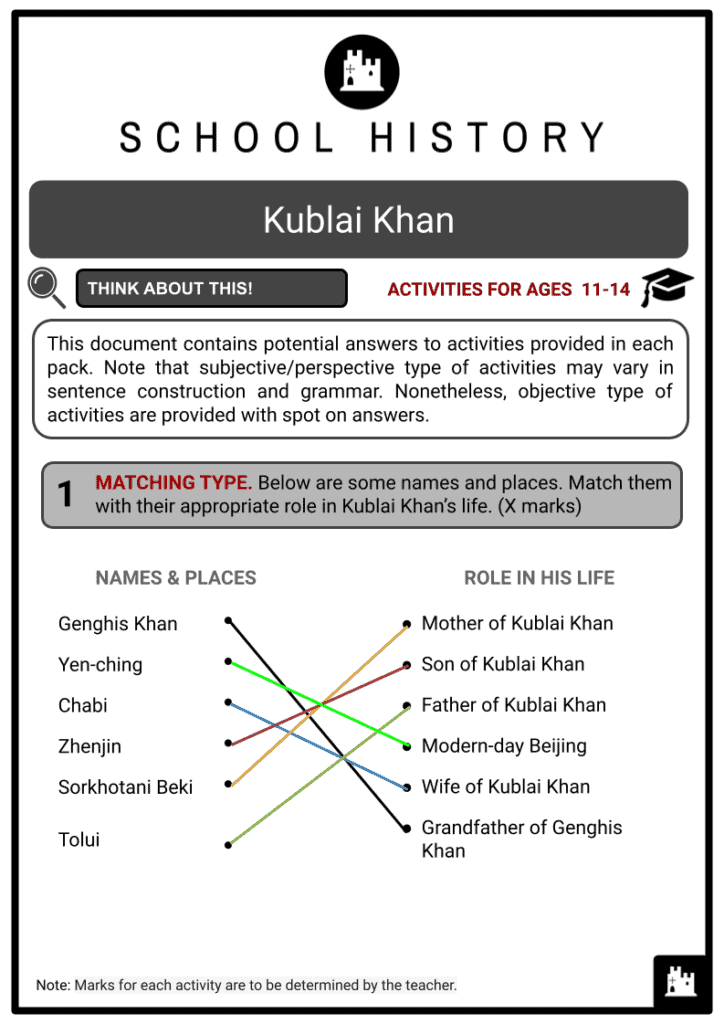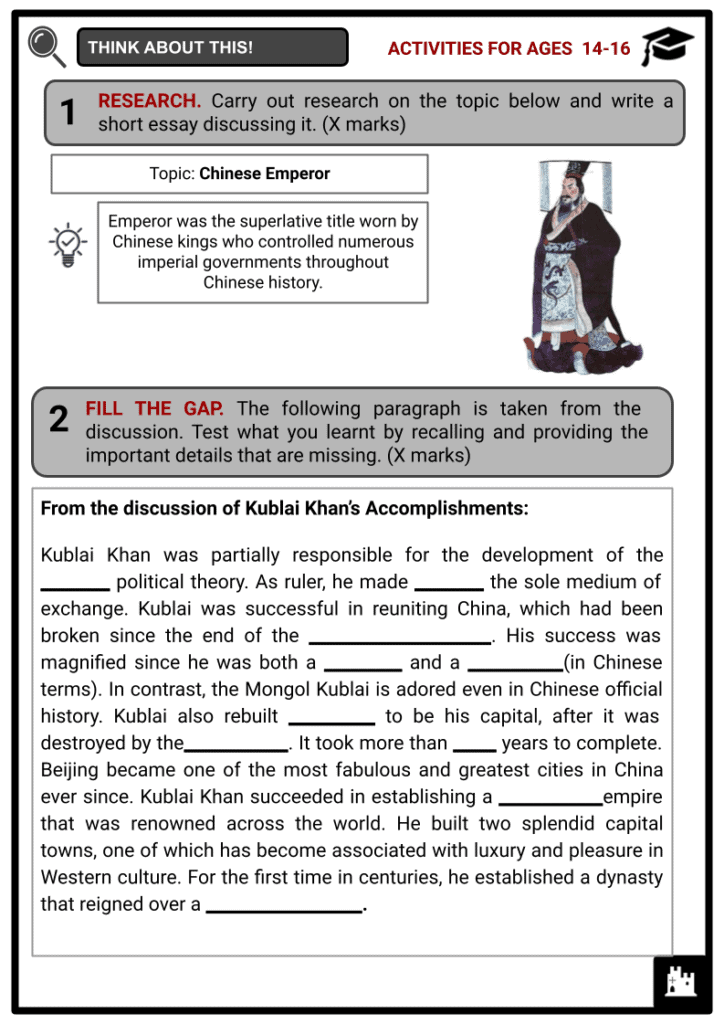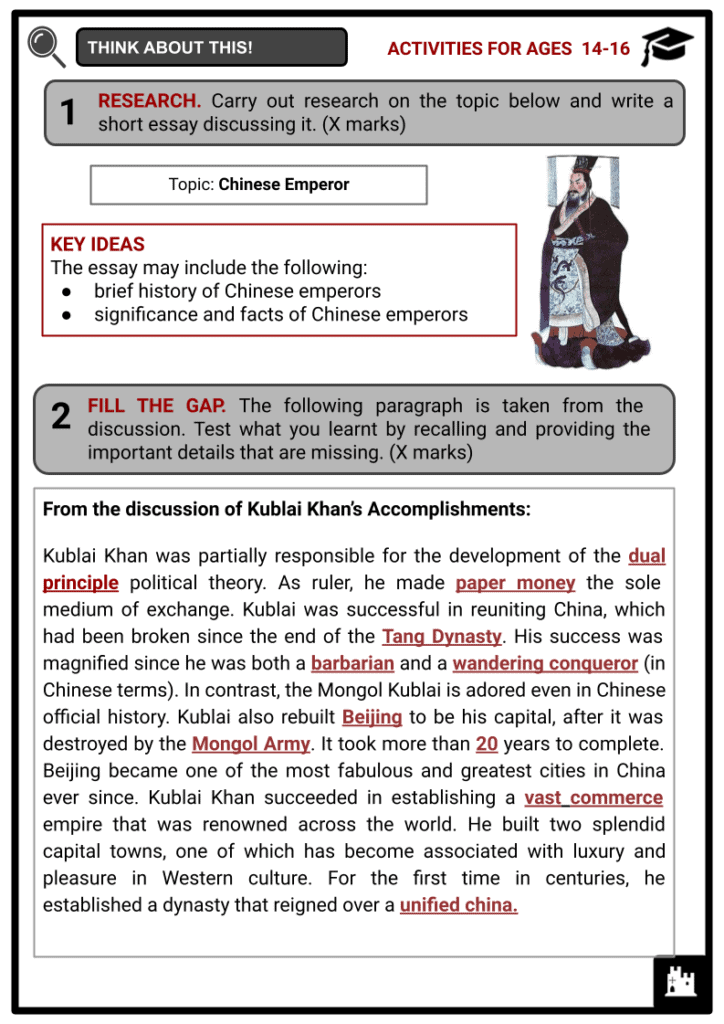Kublai Khan Worksheets
Do you want to save dozens of hours in time? Get your evenings and weekends back? Be able to teach about Kublai Khan to your students?
Our worksheet bundle includes a fact file and printable worksheets and student activities. Perfect for both the classroom and homeschooling!
Summary
- Early Life of Kublai Khan
- Kublai Khan’s accomplishments
- Kublai Khan’s Death and Legacy
Key Facts And Information
Let’s find out more about Kublai Khan!
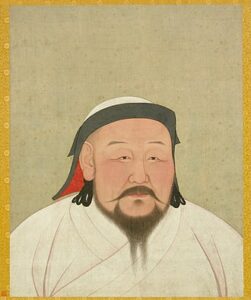
Kublai Khan, the grandson and greatest successor of Genghis Khan, was a Mongolian general and statesman. He was the fifth Emperor of the Yuan (Mongol) dynasty, reigning from 1260 until 1294. In 1279, he completed Genghis Khan’s conquest of China and became the first Yuan ruler of all of China. In Chinese history, he was known as Emperor Shizu of Yuan.
Kublai Khan’s grandfather, Genghis Khan, was a Mongolian warrior-ruler and one of history’s most renowned conquerors, who merged tribes into a unified Mongolia before expanding his kingdom across Asia to the Adriatic Sea. Before Genghis Khan consolidated them under his centralised control in 1206, the Mongols were a parvenu nomadic power, no more than a group of largely autonomous tribes, more or less unknown to recorded history.
Early Life of Kublai Khan
- The Mongol kingdom had spread from the Caspian Sea east to the Pacific Ocean by the time Genghis’ grandson Kublai was born in 1215. The Mongols had taken Yen-ching (modern-day Beijing) in northern China the previous year, forcing the royal family to retreat south.
- Kublai was the fourth and youngest son of Genghis’ son Tolui and a lady called Sorkhotani Beki, a Nestorian Christian princess of the Kereyid Confederacy. Kublai and his siblings were mostly nurtured by their mother, a clever and tolerant woman who committed herself to her sons’ careers.
- Little is known about Kublai’s childhood, however he and his siblings were taught the skill of combat at an early age. Kublai was said to be an expert in Mongolian customs, having successfully hunted an antelope at the age of nine.
- Kublai was also exposed to Chinese philosophy and culture early on thanks to his mother, who also ensured that he learned to read and write Mongol (though he wasn’t taught Chinese).
- The most visible, and certainly most consequential aspect of Kublai Khan’s early life was his interest in and study of contemporary Han culture. Haiyun, the preeminent Buddhist monk in northern China, was invited to Kublai’s ordo in Mongolia. When Kublai visited Haiyun in Karakorum in 1242, he inquired about Buddhist doctrine. Haiyun called Kublai’s son, born in 1243, Zhenjin. Haiyun also introduced Kublai to Liu Bingzhong, a prominent Daoist (Taoist) and Buddhist monk of the time. When Haiyun returned to his temple in modern Beijing, Liu, a painter, calligraphy, poet and mathematician, became Kublai’s adviser. Kublai quickly recruited the Shanxi scholar Zhao Bi to his retinue. Kublai also engaged individuals of various nations because he wanted to balance Mongol and Turkic interests.
Kublai Khan’s accomplishments
- Kublai Khan is remembered as one of China’s greatest emperors. He also helped form the political traditions of his Mongol people. The ‘dual principle’ theory — parity of power and dignity of religion and state in political affairs — is attributed to him and an adviser, ’Phags-pa, and was applied in the subsequent history of Mongolia.
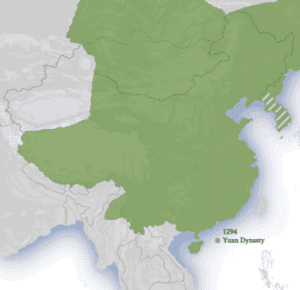
The Yuan Dynasty of China - Kublai Khan was partially responsible for the development of the ‘dual principle’ political theory. As ruler, he made paper money the sole medium of exchange.
- Kublai was successful in reuniting China, which had been broken since the end of the Tang dynasty (618–907 BCE).
- His success was magnified since he was both a barbarian and a wandering conqueror (in Chinese terms). In contrast, the Mongol Kublai is adored even in Chinese official history.
- Kublai also rebuilt Beijing to be his capital, after it was destroyed by the Mongol army. It took more than 20 years to complete. Beijing became one of the most fabulous and greatest cities in China ever since.
- Kublai Khan succeeded in establishing a vast commerce empire that was renowned across the world. He built two splendid capital towns, one of which has become associated with luxury and pleasure in Western culture. For the first time in centuries, he established a dynasty that reigned over a unified China.
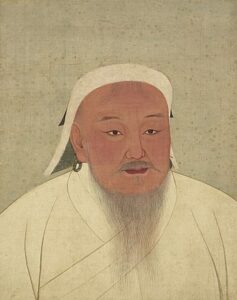
Genghis Khan, mongolian ruler and grandfather of Kublai Khan - Victory in Northern China
- Kublai’s older brother Möngke was appointed Khan of the Mongol Empire in 1251, and Khwarezmian Mahmud Yalavach and Kublai were dispatched to China. Kublai was appointed viceroy of northern China and relocated his ordo to central Inner Mongolia. Kublai administered his province successfully as viceroy, enhanced Henan agricultural output, and raised social welfare spendings after gaining Xi’an. These efforts drew praise from ethnic Han warlords and were critical to the establishment of the Yuan dynasty.
- Kublai was instructed to attack Yunnan in 1253, and he attempted to persuade the Dali Kingdom to capitulate. The governing Gao family resisted by assassinating Mongol envoys. Despite the assassination of his emissaries, Kublai captured Dali and saved its inhabitants.
- Further naval expansion
- Kublai, against the advice of some of his Mongol officials, decided to invade Japan, Burma, Vietnam and Java, over the opposition of some of his Confucian-trained experts. He also attempted to conquer remote territories like Sakhalin, whose indigenous people ultimately succumbed to the Mongols after Kublai’s death in 1308. These costly wars and conquests, as well as the advent of paper currency, all contributed to inflation. From 1273 to 1276, warfare between the Southern Song dynasty and Japan raised the issuance of paper currency from 110,000 ding to 1,420,000 ding.
- Invasions of Japan
- Within Kublai’s court, his most trusted governors and advisers were Mongol, Semu, Korean, Hui and Han peoples recruited by meritocracy with the spirit of multiculturalism. Because the Wokou offered support to the failing Southern Song dynasty, Kublai Khan launched invasions of Japan.
- Kublai Khan tried two attacks on Japan. Both attempts are reported to have been thwarted in part by bad weather or a flaw in the design of ships based on river boats with no keels, and his fleets were destroyed.
- Invasions of Vietnam
- Kublai Khan fought Vietnam many times, including major battles in 1258, 1285 and 1287. Despite catastrophic military failures, a lot of experts view these three operations as successes because they established tributary links. Vietnamese historiography, on the other hand, sees the battle as a decisive triumph over the foreign invaders known as ‘the Mongol yokes’.
- Southeast Asia and South Seas
- Three campaigns against Burma, in 1277, 1283 and 1287, led Mongol armies to the Irrawaddy Delta, where they seized Bagan, the Pagan Kingdom’s capital, and founded their kingdom. Kublai had to settle for ceremonial suzerainty, but Pagan eventually became a tributary state, sending payments to the Yuan court until the Yuan dynasty was defeated by the Ming dynasty in 1368. Mongol interests in these territories were mostly commercial and tributary in nature.
- Europe
- Direct contact between East Asia and Europe was established under Kublai, assisted by Mongol dominance over central Asian trade routes and made feasible by the development of excellent mail networks. Europeans and Central Asians – merchants, traders and missionaries of various orders – arrived in China during the beginning of the 13th century. The presence of Mongol authority permitted vast numbers of Yuan subjects to go to other areas of the Mongol Empire, all the way to Rus, Persia and Mesopotamia, for fighting or trade.
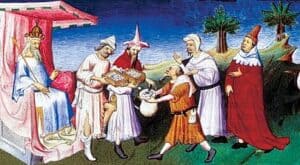
Kublai gives financial support to the Polo family.
- Direct contact between East Asia and Europe was established under Kublai, assisted by Mongol dominance over central Asian trade routes and made feasible by the development of excellent mail networks. Europeans and Central Asians – merchants, traders and missionaries of various orders – arrived in China during the beginning of the 13th century. The presence of Mongol authority permitted vast numbers of Yuan subjects to go to other areas of the Mongol Empire, all the way to Rus, Persia and Mesopotamia, for fighting or trade.
- Africa
- In the 13th century, the Sultanate of Mogadishu had earned enough respect in Asia via commerce with previous Chinese dynasties to draw the attention of Kublai Khan. Kublai despatched an ambassador to Mogadishu to spy on the Sultanate, according to Marco Polo, but the mission was seized and imprisoned. Kublai Khan then dispatched another envoy to negotiate the release of the previous Mongol embassy to Africa.
Kublai Khan’s Death and Legacy
- Kublai Khan established the Great Yuan Great Mongol State, often known as the Mongol or Yuan dynasty, in 1271, which he officially declared in traditional Chinese manner. It was the first foreign dynasty to rule over all of China, and the Yuan ruled over much of Asia and Eastern Europe.
- After a magnificent reign of 34 years, Kublai Khan died at Ta-tu in February 1294. He is recognised as one of the greatest rulers in history. He ruled over a huge kingdom with wisdom and consideration. His achievements ranked him second only to Genghis Khan among Mongol rulers, and he was well-liked by the Chinese. By partially embracing Chinese political traditions and deploying divide-and-rule strategies to help in the management of a huge empire, he exhibited great foresight.
- After his beloved wife Chabi died in 1281 and his oldest son died in 1285, Kublai began to withdraw from the day-to-day governance of his kingdom. He drank and ate excessively, causing him to gain weight and aggravate his gout, which had been bothering him for years. He died on 18 February 1294, at the age of 79, and was interred at Mongolia’s secret Khan burial place.
- The reign of Kublai Khan had a huge influence on Asian history. He is recognised as one of history's greatest kings. After centuries of conflict and warfare, he unified China and governed with shrewdness. Although the Yuan Dynasty only lasted until 1368, it set the tone for the subsequent ethnic-Manchu Qing Dynasty.
Image Sources
- https://upload.wikimedia.org/wikipedia/commons/thumb/1/1b/YuanEmperorAlbumKhubilaiPortrait.jpg/330px-YuanEmperorAlbumKhubilaiPortrait.jpg
- https://upload.wikimedia.org/wikipedia/commons/thumb/9/96/Yuen_Dynasty_1294_-_Goryeo_as_vassal.png/330px-Yuen_Dynasty_1294_-_Goryeo_as_vassal.png
- https://upload.wikimedia.org/wikipedia/commons/thumb/3/35/YuanEmperorAlbumGenghisPortrait.jpg/330px-YuanEmperorAlbumGenghisPortrait.jpg
- https://upload.wikimedia.org/wikipedia/en/thumb/5/5b/Kublai_giving_support_to_the_Venetians.JPG/405px-Kublai_giving_support_to_the_Venetians.JPG

